Introduction
In the pursuit of a healthier lifestyle, understanding the nuances of fat loss is paramount. Many individuals grapple with the question of how much fat can realistically be shed in a week, often unaware that the journey involves more than just calorie counting.
Research reveals that a safe and sustainable rate of fat loss typically ranges from 1 to 2 pounds per week, influenced by a variety of factors including individual metabolism, sleep quality, and dietary choices.
This article delves into the essential components that contribute to effective weight management, from the critical roles of hydration and sleep to the psychological aspects that can hinder progress. By fostering a comprehensive approach that incorporates balanced nutrition, regular exercise, and mental well-being, individuals can cultivate a path toward lasting health and vitality.
Empowering teams to embrace these strategies not only enhances individual well-being but also promotes a culture of health within organizations, paving the way for collective success.
Realistic Expectations: How Much Fat Can You Lose in a Week?
A commonly asked question in the realm of fat reduction is, 'How much fat can I lose in a week?' When considering how much fat can I lose in a week, aiming for a safe and sustainable rate of fat reduction typically falls between 1 to 2 pounds weekly, which corresponds to a caloric deficit of roughly 3,500 to 7,000 calories. However, it's vital to recognize that this rate can be influenced by various factors, including starting mass, age, gender, and individual metabolism.
Research has demonstrated that when dieters lack sufficient sleep, especially over 14 days, their fat reduction can be significantly obstructed—by as much as 55%, according to studies from Loudcloudhealth. This emphasizes the importance of sustaining a healthy attitude towards reducing body mass, prioritizing gradual changes over drastic actions that may result in burnout or health issues. Furthermore, legislative measures like junk food taxes and enhanced nutritional labeling can play a vital role in encouraging healthier eating habits, which supports fat reduction strategies.
By establishing realistic expectations and acknowledging the significance of factors such as rest, individuals can nurture motivation and promote long-term success in attaining a healthier body composition. A case study titled 'Impact of Sleep on Reducing Body Mass' further illustrates this point, showing that adequate sleep is crucial for effective reduction and overall health.
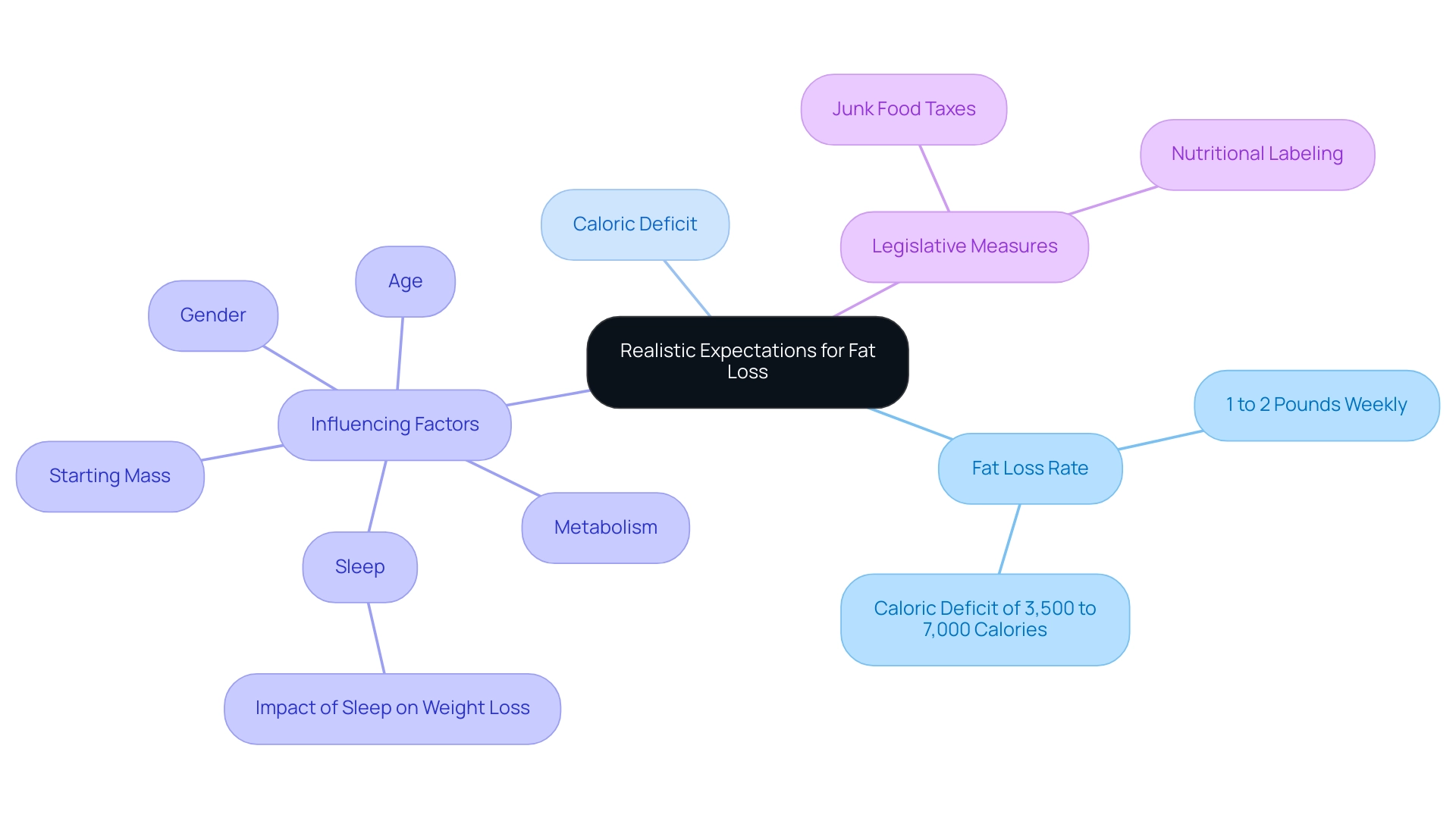
Key Factors Influencing Weekly Fat Loss: Diet and Exercise Strategies
To determine how much fat can I lose in a week, one must focus on two critical components: diet and exercise strategies. A balanced diet, rich in whole foods—fruits, vegetables, lean proteins, and whole grains—plays a crucial role in determining how much fat can I lose in a week by creating a caloric deficit essential for reducing body mass. It's equally important to monitor portion sizes and limit the intake of processed foods, as these can undermine fat reduction efforts.
Significantly, a meta-analysis of 29 long-term reductions in body mass studies uncovered that over half of the lost mass is regained within two years, highlighting the difficulties of sustaining body mass reduction. When considering exercise, it's important to know how much fat can I lose in a week by combining cardiovascular workouts with strength training. While cardio exercises help burn calories, strength training builds muscle mass, which can subsequently elevate resting metabolic rates.
Fitness expert Kevin Hall emphasizes the significance of maintaining a healthy metabolic rate, noting, 'the resting metabolic rate of the participants is below 400 calories, which led to them gaining most of their weight back.' Furthermore, incorporating physical activities into daily routines—such as organizing team fitness challenges, utilizing our wellness coaching app for personalized workouts and nutrition guidance, or encouraging walks during lunch breaks—can significantly boost motivation and accountability among team members. Given that our corporate memberships include comprehensive pantry services, in-person wellness talks, and tailored coaching, it is crucial for HR Benefits Managers to adopt effective fat reduction strategies that empower their teams to achieve their goals through comprehensive health coaching services and enhance overall well-being.
By leveraging the app's daily programming feature, employees can receive the support they need to stay on track with their health objectives.
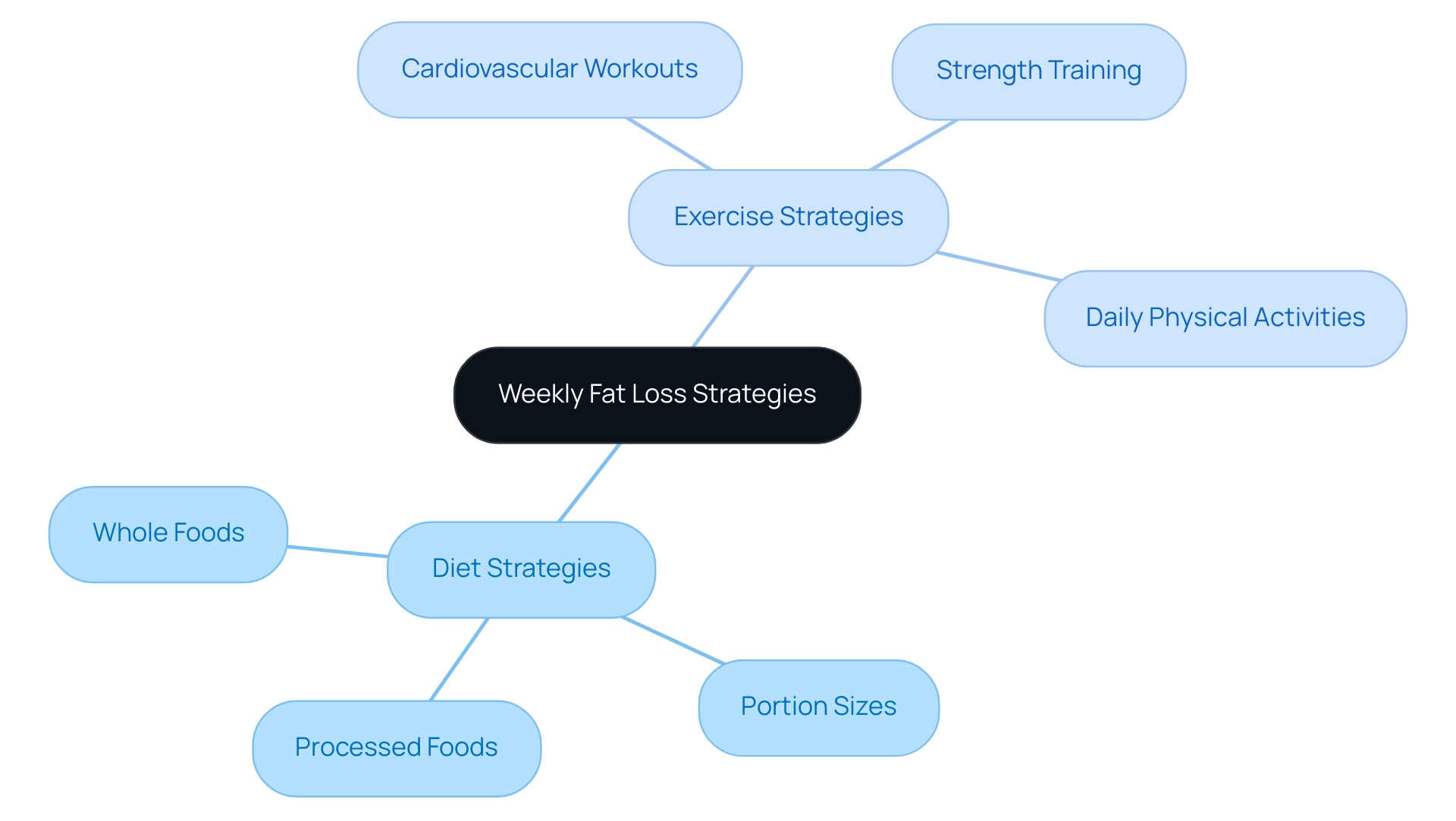
The Importance of Hydration in Fat Loss
Hydration is not merely a component of health—it's a cornerstone of effective fat reduction, influencing how much fat can I lose in a week. Water plays a critical role in essential metabolic functions, including digestion, nutrient absorption, and the breakdown of fat. Staying hydrated is key to appetite regulation, as many individuals often confuse thirst with hunger.
In fact, studies have shown that consuming water before meals can lead to a significant reduction in calorie intake, making it a simple yet effective strategy for managing body mass. The goal should be to drink at least eight 8-ounce glasses of water daily, with increased intake during exercise or in warmer weather to support metabolic demands. By prioritizing hydration, individuals can significantly improve their efforts regarding how much fat can I lose in a week while also strengthening their overall health.
Historically, the rise in snacking among U.S. adults between 1977 and 2006 underscores the evolving dietary practices that may affect hydration and body management. A recent study highlights the significance of effective strategies, revealing that 35.67% of North Carolinians successfully shed pounds during the pandemic, a testament to the power of proper hydration. Moreover, a meta-analysis named 'Water Intake and Body Mass' shows notable differences in body mass results due to beverage substitutions, emphasizing the essential role of water in reducing body mass.
As Loudcloudhealth observes, 'To reduce mass and maintain health, an individual must obtain sufficient sleep,' indicating that hydration, rest, and mass management are linked. One of our clients, Sarah, shared, 'Incorporating hydration strategies into my routine, with guidance from my coach, helped me lose 15 pounds and feel more energetic.' This emphasizes how tailored coaching can effectively incorporate hydration into a reduction program.
By implementing these hydration strategies, HR Benefits Managers can champion a culture of health and vitality within their teams and inspire others to take control of their well-being in 2024. With personalized coaching and experienced guidance, you can help your team make lasting lifestyle changes that enhance their health and productivity. Let's discuss how we can support you in fostering a thriving environment that prioritizes wellness—contact us today to schedule a consultation!
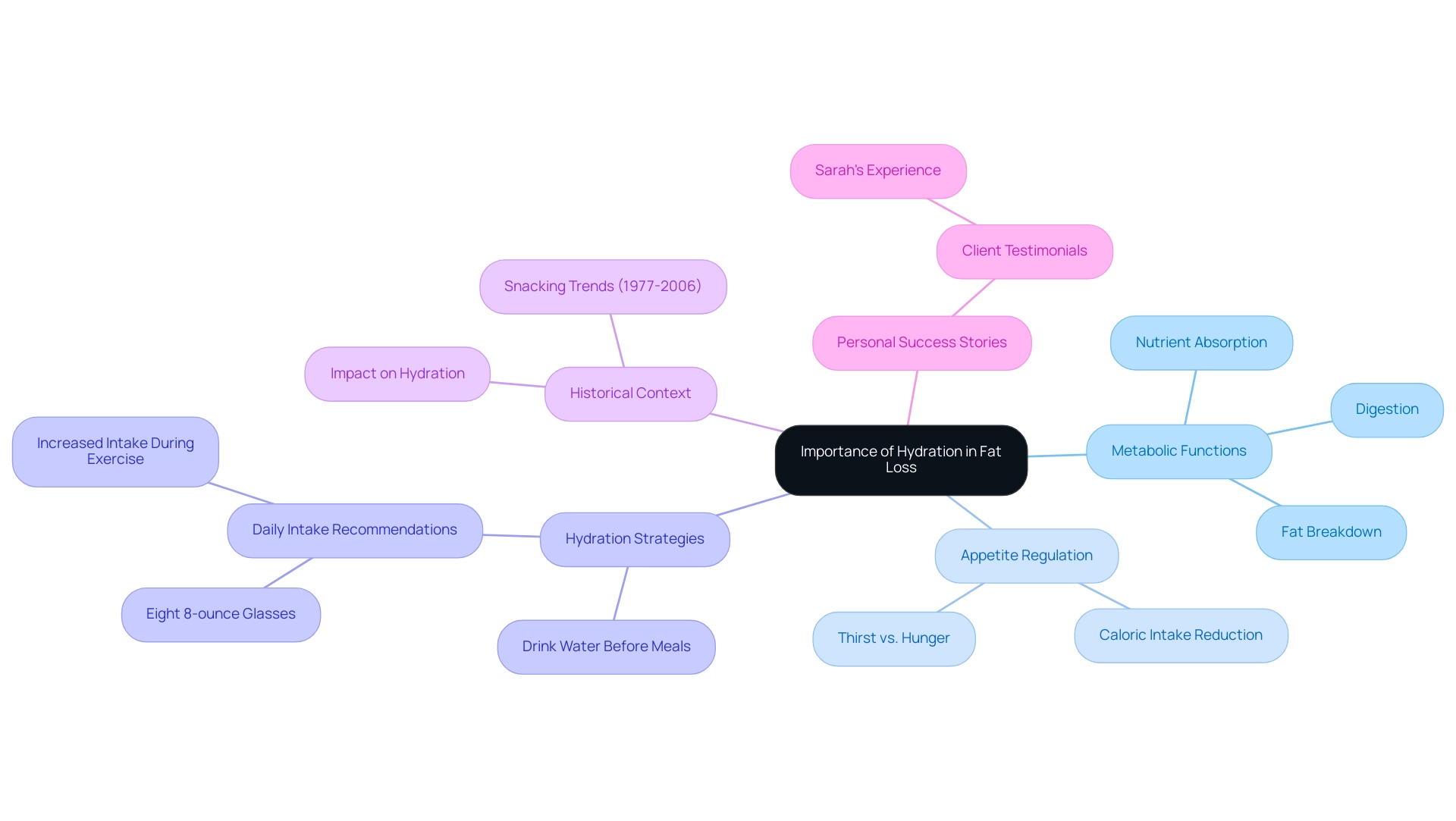
The Role of Sleep in Weight Management
Rest is a potent, yet frequently disregarded, companion in the pursuit of efficient body management and fat reduction. Research indicates that insufficient rest can disrupt hormonal balance, leading to increased appetite and cravings for unhealthy, calorie-dense foods. Alarmingly, 26.3% of adults who consistently receive 9 hours or more of rest are categorized as obese, highlighting the intricate connection between rest and body mass.
The Zurich Cohort Study further reveals a compelling trend: participants who averaged less than 5 hours of rest gained mass at a rate of nearly 0.4 kg per year, while those who enjoyed over 9 hours experienced loss. However, further analysis is needed to fully understand the causal relationships and influencing factors that connect rest and health behaviors. For older adults who rest for 9 hours or more, it’s noteworthy that:
- 9.9% smoke cigarettes
- 3.8% have five or more drinks in one day
- 62.8% are physically inactive
- 22.3% are classified as obese
This indicates that lifestyle factors also play a significant role in weight management.
To understand how much fat can I lose in a week, it’s essential to harness the benefits of rest for metabolic health by aiming for 7 to 9 hours of quality recovery each night. Creating a consistent rest schedule, minimizing screen time before bed, and establishing a calming pre-rest routine can significantly enhance rest quality. Real-life instances, such as people who have effectively enhanced their rest habits and subsequently shed pounds, can offer inspiration and practical insights.
As Dr. Debra A. Babcock states,
Good Sleep, Better Life—Enhancing Health and Safety With Optimal Sleep.
By recognizing and emphasizing the significance of sleep, individuals can not only enhance their management efforts but also improve their overall well-being and productivity.
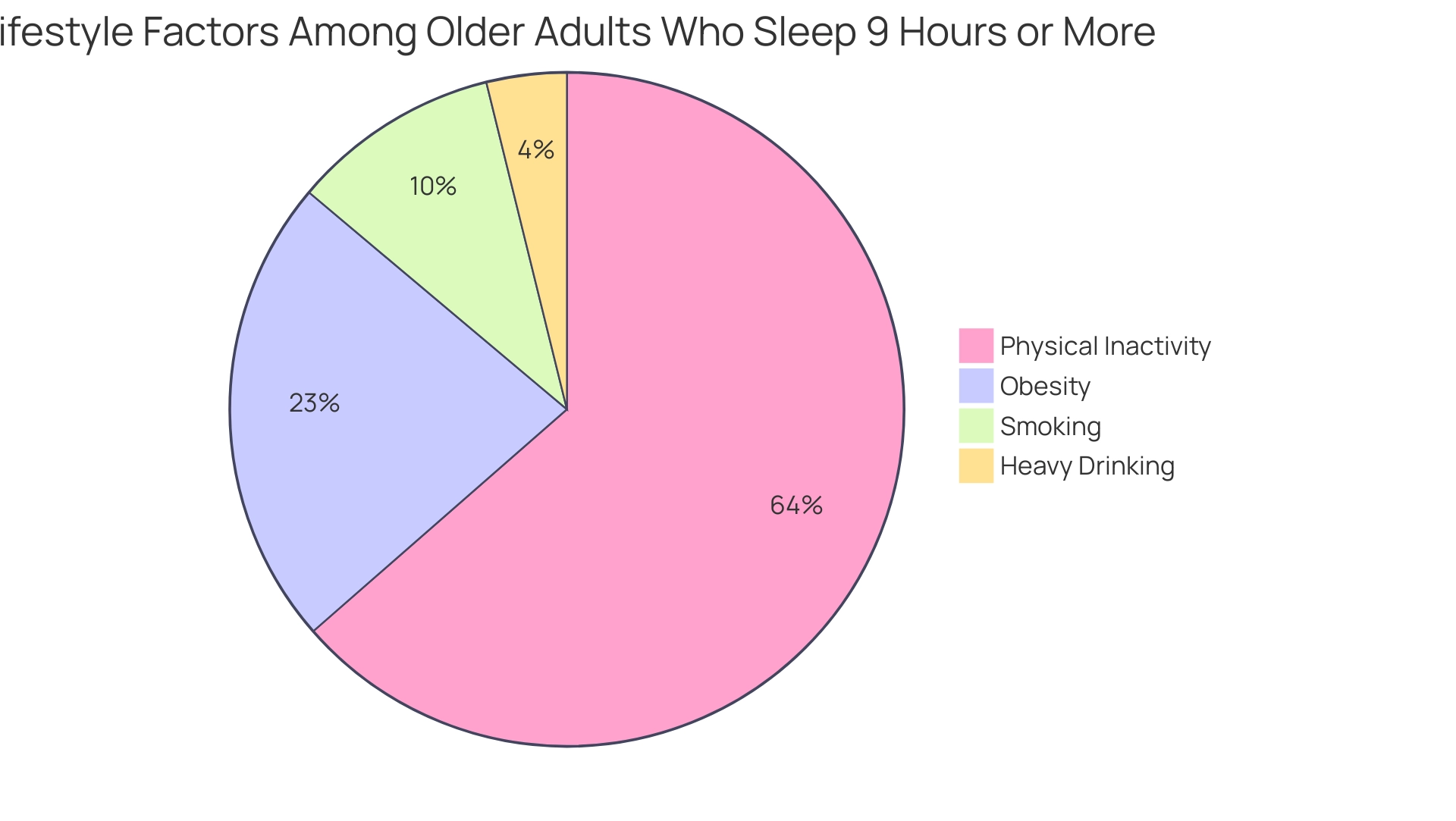
Mental Health and Fat Loss: The Psychological Aspect
The interaction between mental well-being and fat reduction is significant and cannot be ignored. It's crucial not only for individual well-being but also for fostering a confident, stress-free life. Research reveals that more than 54.6% of individuals struggling with moderate to severe depressive symptoms, especially those on antidepressant medication, encounter substantial obstacles in their reduction journey.
This statistic underscores the critical link between mental health struggles and obesity, as these individuals often encounter barriers that complicate their efforts to shed pounds. Emotional eating often arises as a coping strategy, further hindering efforts to reduce body mass. To combat these challenges, it's essential to cultivate healthy coping strategies.
- Mindfulness practices
- Meditation
- Engaging in hobbies
These can serve as effective tools for managing stress and enhancing overall well-being. Furthermore, Recode Performance provides customized counseling and wellness initiatives aimed at assisting individuals in managing their mental well-being and health journeys. Building a supportive network of friends, family, or professionals can provide the encouragement and accountability necessary to navigate this journey successfully.
The American Society of Plastic Surgeons' report on plastic surgery statistics also highlights the importance of addressing body image issues, which can significantly impact mental health and emotional eating patterns. Concerns about substance abuse following bariatric surgery, as discussed in recent case studies, illustrate the complexities surrounding mental health and reduction, particularly regarding the concept of 'addiction transfer.' As M J O'Brien, MD, MSc, suggests, comprehending the timing of mental health changes is essential for attaining weight reduction success.
By actively recognizing and addressing mental health challenges, individuals can adopt a holistic approach that not only promotes sustainable fat loss but also helps them consider how much fat can I lose in a week, empowering them to live healthier, more fulfilling lives. Feel proud and confident walking through life with the support of Recode Performance's services, laying the groundwork for a confident and stress-free existence for both individuals and their families.
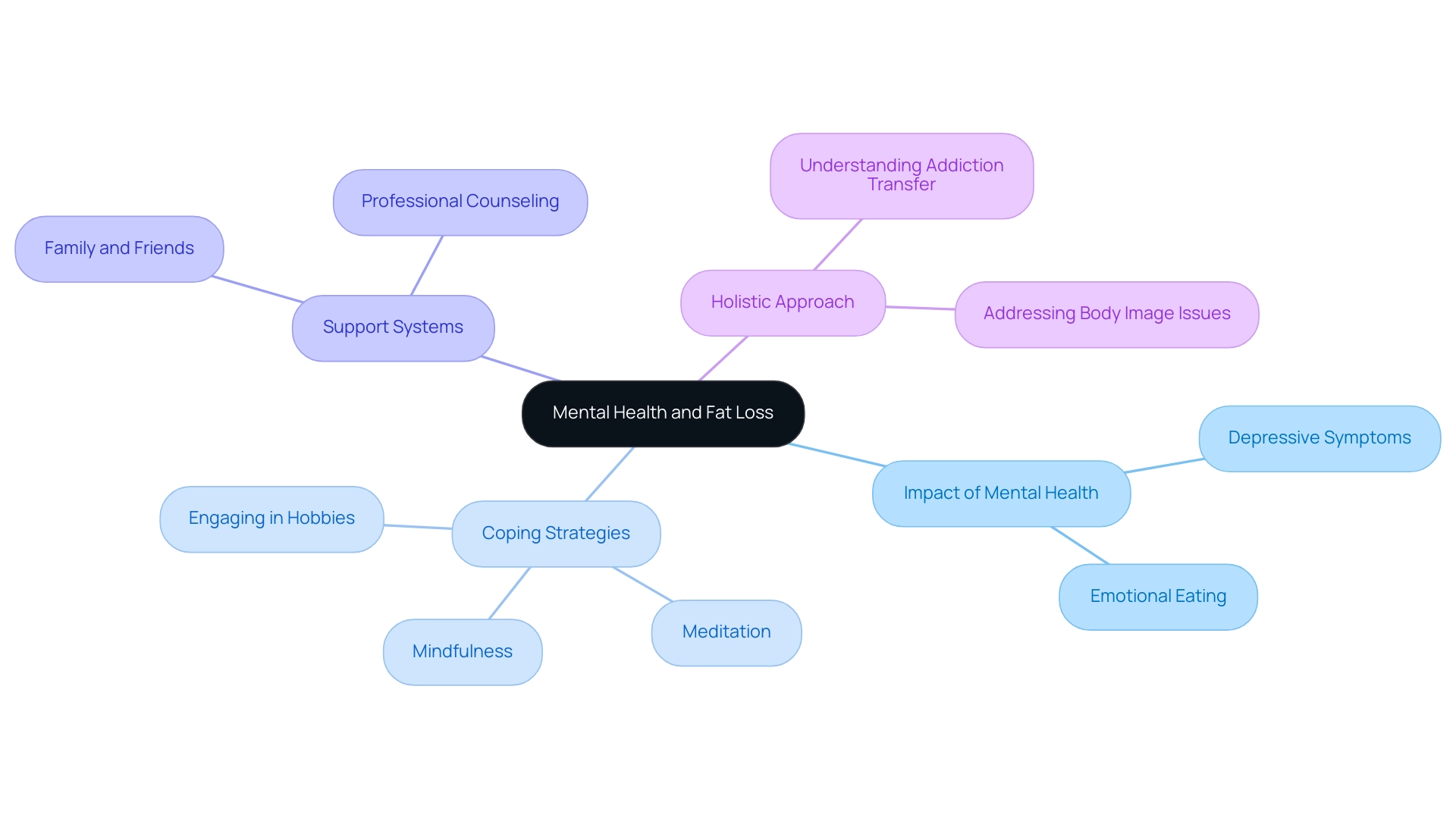
Conclusion
In the journey toward effective fat loss, understanding and implementing a holistic approach is essential. The safe and sustainable rate of fat loss, typically between 1 to 2 pounds per week, is influenced by various factors including:
- Diet
- Exercise
- Sleep
- Hydration
- Mental health
By prioritizing balanced nutrition rich in whole foods and engaging in regular physical activity, individuals can establish a caloric deficit while enhancing their overall health.
Moreover, the importance of hydration and sufficient sleep cannot be overstated. Staying well-hydrated aids in appetite regulation and metabolic functions, while quality sleep is crucial for hormonal balance and weight management. Together, these elements create a solid foundation for achieving lasting results.
Mental health also plays a significant role in weight loss, as emotional well-being directly impacts motivation and behavior. By fostering healthy coping mechanisms and creating supportive environments, individuals can overcome psychological barriers and stay committed to their health goals.
As organizations embrace these comprehensive strategies, they not only empower employees to take control of their health but also cultivate a thriving culture of well-being. By leveraging available resources, such as wellness coaching and team challenges, HR Benefits Managers can inspire their teams to prioritize health and vitality, ultimately leading to a more productive and engaged workforce. Now is the time to take action, champion wellness, and pave the way for a healthier future for all.




